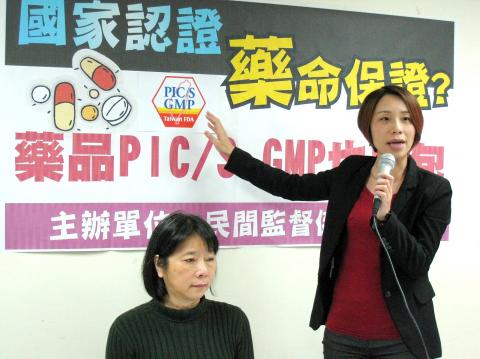The National Health Insurance Civilian Surveillance Alliance yesterday questioned the legitimacy of a certification for pharmaceutical manufacturers after a majority of the manufacturers that were required by the Food and Drug Administration (FDA) to re-file bioequivalence testing (BE) reports for changes made to their products were awarded PIC/S GMP or GMP certification.
BE testing is conducted to ensure that a generic drug delivers the same therapeutic effect as a reference brand-name pharmaceutical.
In response, the agency said that the changes to the drugs were “legitimate” and have no negative impact on drug safety.

Photo: Wei Yi-chia, Taipei Times
At the end of August, the health insurance watchdog held a press conference to report that as many as 3,841 drug products failed to comply with pharmaceutical regulations after making changes to package inserts, packaging and the excipients used in drugs without seeking re-approval by the regulator.
In response, the agency promised to hold risk assessment meetings to evaluate the drugs that had been altered.
This month, the agency announced that 33 out of 3,841 generic drug products would need to be tested for their bioequivalence with brand-name medicines, with 21 more to be examined.
The group found that 10 of the 11 drug manufacturers that produce the 33 drugs are PIC/S GMP (Pharmaceutical Inspection Convention and Pharmaceutical Inspection Co-operation Scheme, or the guide to Good Manufacturing Practice for medicinal products) or GMP certified.
“The government has required all pharmaceutical manufacturers to be PIC/S-certified by the end of next year, after which those without will not be permitted to make or sell drugs in Taiwan,” alliance spokeswoman Eva Teng (滕西華) said.
“However, the 10 manufacturers account for 15.8 percent of the 57 PIC/S GMP-certified manufacturers in the country. This makes us concerned that the certification does not guarantee drug quality,” Teng added.
The lack of BE testing reports for drugs that have been altered is a major problem, the group said.
“Changing the excipient, the diluent or the vehicle of a drug could decrease its therapeutic effect,” alliance convener Huang Sue-ying (黃淑英) said, adding that the agency should have ordered that the 33 drug products be pulled off shelves immediately after the announcement this month.
“The agency asked doctors to look for substitutes as soon as possible, and said that the drugs were without health risks,” she said.
FDA official Chi Jo-feng (祁若鳳) said that the PIC/S GMP certificate would not be revoked unless the violations are “grave,” such as producing counterfeit drugs, adding that the drugs were not withdrawn from the market immediately because some patients need time to switch to a new drug.
The agency updated the list in a statement yesterday, announcing the final result of the assessment for the need of BE testing on a total of 54 drugs (including the 33 announced earlier), which said that only nine of the 54 would need to redo BE testing.
One of the 33 drugs required to be tested this month was made exempt because the manufacturer had subsequently handed in relevant documents, while several others decided to revert to the original formula or simply give up the permit for the drug and had their products pulled off shelves, an FDA official said.

‘DENIAL DEFENSE’: The US would increase its military presence with uncrewed ships, and submarines, while boosting defense in the Indo-Pacific, a Pete Hegseth memo said The US is reorienting its military strategy to focus primarily on deterring a potential Chinese invasion of Taiwan, a memo signed by US Secretary of Defense Pete Hegseth showed. The memo also called on Taiwan to increase its defense spending. The document, known as the “Interim National Defense Strategic Guidance,” was distributed this month and detailed the national defense plans of US President Donald Trump’s administration, an article in the Washington Post said on Saturday. It outlines how the US can prepare for a potential war with China and defend itself from threats in the “near abroad,” including Greenland and the Panama

The Chinese Nationalist Party (KMT) is maintaining close ties with Beijing, the Democratic Progressive Party (DPP) said yesterday, hours after a new round of Chinese military drills in the Taiwan Strait began. Political parties in a democracy have a responsibility to be loyal to the nation and defend its sovereignty, DPP spokesman Justin Wu (吳崢) told a news conference in Taipei. His comments came hours after Beijing announced via Chinese state media that the Chinese People’s Liberation Army’s Eastern Theater Command was holding large-scale drills simulating a multi-pronged attack on Taiwan. Contrary to the KMT’s claims that it is staunchly anti-communist, KMT Deputy

RESPONSE: The government would investigate incidents of Taiwanese entertainers in China promoting CCP propaganda online in contravention of the law, the source said Taiwanese entertainers living in China who are found to have contravened cross-strait regulations or collaborated with the Chinese Communist Party (CCP) could be subject to fines, a source said on Sunday. Several Taiwanese entertainers have posted on the social media platform Sina Weibo saying that Taiwan “must be returned” to China, and sharing news articles from Chinese state media. In response, the Mainland Affairs Council (MAC) has asked the Ministry of Culture to investigate whether the entertainers had contravened any laws, and asked for them to be questioned upon their return to Taiwan, an official familiar with the matter said. To curb repeated

Myanmar has turned down an offer of assistance from Taiwanese search-and-rescue teams after a magnitude 7.7 earthquake struck the nation on Friday last week, saying other international aid is sufficient, the National Fire Agency said yesterday. More than 1,700 have been killed and 3,400 injured in the quake that struck near the central Myanmar city of Mandalay early on Friday afternoon, followed minutes later by a magnitude 6.7 aftershock. Worldwide, 13 international search-and-rescue teams have been deployed, with another 13 teams mobilizing, the agency said. Taiwan’s search-and-rescue teams were on standby, but have since been told to stand down, as